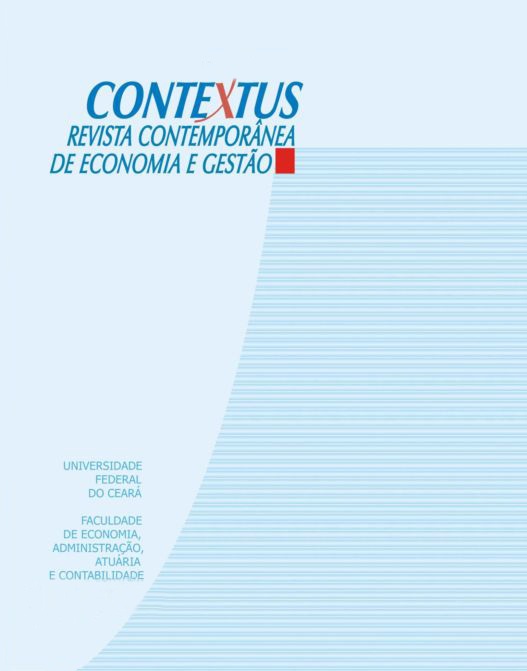ANÁLISIS DE ESTADOS DE RESULTADO COMPLETO DESPUÉS DE LA IMPLEMENTACIÓN DE LAS IFRS EN BRASIL
DOI:
https://doi.org/10.19094/contextus.v13i1.584Palabras clave:
Estado de resultados integral. Normas internacionales de Contabilidad. Relevancia de la información contable. Otros resultados integrales. Nuevo mercado.Resumen
Este estudio examinó el contenido de la información de la Cuenta de Resultados Integral publicado por 62 empresas en el Novo Mercado de BM & F Bovespa. El análisis estadístico consistió en la aplicación de la prueba pareada diferencia de medias (Prueba T y Prueba Wilcoxon). Además, se realizó un análisis cualitativo. Los resultados indicaron que (a) aproximadamente 50% de las empresas reportó ganancias y pérdidas en otros resultados integrales; (B) los efectos netos de las ganancias y pérdidas fueron positivos en los años 2012 y 2011 y negativo en 2010; (C) los CPC 2 (Efectos de las variaciones en los tipos de cambio y conversión de estados financieros) y CPC 38 (Instrumentos financieros) fueron las más frecuentes y d) existen diferencias entre las métricas Ingresos Netos y Resultado Integral para las empresas analizadas en años 2011 y 2010. Los resultados indican que los elementos de la DRA tienen el potencial de generar volatilidad en la cuenta de resultados si se les reconocen en el Estado de Resultados.
Citas
BAMBER, Linda Smith; JIANG, John Xuefeng; PETRONI, Kathy R.; WANG, Isabel Yanyan. Comprehensive Income: who’s afraid of performance reporting? Accounting Review, California, v. 85, n. 1, p. 97-126, 2010.
BM&FBOVESPA.Disponível em: <http://www.bmfbovespa.com.br>. Acesso em: 22 dez. 2012.
CAHAN, Steven F.; COURTENAY, Stephen M.; GRONEWOLLER, Paul L.; UPTON, David R. Value relevance of mandated comprehensive income disclosures. Journal of Business Finance and Accounting, v. 27, n. 9-10, p. 1273-1301, nov./dez.. 2000.
CHAMBERS, Dennis; LINSMEIER, Thomas J.; SHAKESPEARE, Catherine; SOUGIANNIS, Theodore. An evaluation of SFAS n.130 comprehensive income disclosures. Review of Accounting Studies, v. 12, n. 4, p. 557-593, dez.. 2007.
COMITÊ DE PRONUNCIAMENTOS CONTÁBEIS. CPC 00 (R1)-Estrutural conceitual para elaboração e divulgação de Relatório Contábil Financeiro. Disponível em: <http://www.cpc.com.br/>. Acesso em: 15 jan.2014.
CVM- Comissão de Valores Mobiliários. Disponível em: <http://www.cvm.gov.br/>. Acesso em: 10 abr. 2013.
DEHNING, Bruce; RATLIFF, Paulette A. Comprehensive Income: evidence on the effectiveness of FAS 130. The Journal of American Academy of Business, Cambridge, v. 4, n. 1-2, p. 228-232, mar., 2004.
DHALIWAL, D.; SUBRAMANYAM, K. R.; TREZEVANT, R. Is comprehensive income superior to net income as a measure of firm perfomance. Journal of Accounting and Economics, v. 26, p. 43-67, 1999.
FERRARO, Olga. Comprehensive income in Italy: reporting preferences and its effects on performance indicators. Journal of Modern Accounting and Auditing, v. 7, n. 12, p. 1315-1328, dez.. 2011.
FERRARO, Olga; VELTRI, Stefania. A critical analysis of the empirical researches on comprehensive income value relevance. European Journal of Scientific Research, v. 76, n. 4, p. 587-594, 2012.
JONES, Denise A.; SMITH, Kimberly J. Comparing the value relevance, predictive value, and persistence of other comprehensive income and special items. The Accounting Review, v. 86, n. 6, p. 2047-2073, 2011.
KANAGARETNAM, Kiridaran; MATHIEU, Robert; SHEHATA, Mohamed. Usefulness of comprehensive income reporting in Canada. Journal of Accounting and Public Polic, v. 28, n. 4, p. 349–365, jul./ago. 2009.
LEE, Yen-Jung; PETRONI, Kathy R.; SHEN, Min. Cherry picking, financial reporting quality, and comprehensive income reporting choices: the case of property-liability insurers. . Disponível em: <http://papers.ssrn.com/sol3/papers.cfm?abstract_id=450660>. Acesso em:01 dez.2012.
PINHEIRO, L. E. T.; MACEDO, R. P.; VILAMAIOR, A. G. Lucro Líquido versus Lucro Abrangente: Uma análise empírica da volatilidade. Revista Universo Contábil, v. 8, n. 4, p. 06-18, out./dez., 2012.
PRONOBIS, Paul; ZÜLCH, Henning. The Predictive power of comprehensive income and its individual components under IFRS. Disponível em: http://papers.ssrn.com/sol3/papers.cfm?abstract_id=1576384. Acesso em: 01 dez.2012.
COMITÊ DE PRONUNCIAMENTOS CONTÁBEIS. CPC 26 - Apresentação das Demonstrações Contábeis. Disponível em: < http://www.cpc.org.br>. Acesso em:08 fev. 2013.
RAHMAN, Azhar Abdul; HMADAN, Mohd Diah Hj. Comprehensive Income: reporting preferences of malaysian listed companies on the ACE Market. 2011. Disponível em: <http://wbiconpro.com/315-Azhar.pdf>. Acesso em: 01 dez.2012.
REES, Lynn; SHANE, Phil. Academic research and standard setting: the case of other comprehensive income. Accounting Horizons, v. 26, n. 4, p. 1-27.dez.., 2012.
SILVA, J. S.; SILVA, A. H. C.; LAURENCEL, L. C.. Nível de evidenciação obrigatória nas empresas de capital aberto: uma análise do CPC 27. In: Congresso ANPCONT, 8, 2014, Rio de Janeiro. Anais... Rio de Janeiro, 2011.
TARCA, A.; BROWN, P.; HANCOCK, P.; WOODLIFF, D.; BRADBURY, M.; ZIJL, T. V.. Identifying decision useful information with the matrix format income statement. Journal of International Financial Management and Accounting, v. 19, n. 2, p. 184-217, jun., 2008.
Descargas
Publicado
Cómo citar
Número
Sección
Licencia
The authors, while doing the submission, accept the notice below:
We authors hold the copyright related to our paper and transfer Contextus journal the right for the first publication with a Creative Commons’ international license of the modality Attribution – Non-commercial 4.0, which in turn allows the paper to be shared providing that both the authorship and the journal’s right for initial release are acknowledged.
Furthermore, we are aware of our permission to take part in additional contracts independently for non-exclusive distribution of the version of our work published in this journal (e.g. publishing it in an institutional repository or as a book chapter), while acknowledging both the authorship and the journal’s initial publication.
We also certify that the paper is original and up to this date has not been released in any other journal, Brazilian or of another nationality, either in Portuguese or another language, as well as it has not been sent for simultaneous publication in other journals.
Last, we not only know that plagiarism is not tolerated by Contextus but also certify the paper presents the sources of passages from cited works, including those authored by ourselves.


